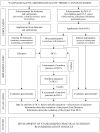Do Preschools Offer Healthy Beverages to Children? A Nationwide Study in Poland
- PMID: 29072604
- PMCID: PMC5707639
- DOI: 10.3390/nu9111167
Do Preschools Offer Healthy Beverages to Children? A Nationwide Study in Poland
Abstract
Background: Children's beverage consumption patterns have received increased attention in light of the obesity epidemic in this group. In day care centers (DCCs), children spend up to 10 h a day, and typically consume half to three quarters of their daily food intake. The purpose of the study was to investigate what beverages are typically served to children in preschools in Poland, and to evaluate the practices associated with adding sugar and other sweetening agents to beverages.
Methods: Direct interviews with preschools staff were conducted with a questionnaire regarding offered beverages and adding sugar and other sweetening agents. The menu of 10 consecutive days and inventory reports were analyzed to verify information.
Results: A total of 720 preschools were included in the study. Cocoa and milk coffee substitute were served in 95% of preschools, followed by compote (92%), tea (84%), fruit/herbal tea (73%) and water (69%). Water was the only beverage available between meals (93% DCCs). 86% of preschools added sugar to tea/cocoa/coffee substitute drinks, and 74% to compote.
Conclusions: In the majority of preschools, beverages which are not recommended were offered. Such an assortment of beverages and common practice of sweetening can increase the amount of added sugar in a children diet. Nutrition education and legal regulations concerning the assortment of beverages served in preschools are urgently needed.
Keywords: beverages; dietary prevention; nutrition recommendation; preschool; preschool children; sugars.
Conflict of interest statement
The authors declare no conflict of interest. The founding sponsors had no role in the design of the study; in the collection, analyses, or interpretation of data; in the writing of the manuscript, and in the decision to publish the results.
Figures
References
-
- Overweight/Obesity by Age-Children. [(accessed on 28 July 2017)]; Available online: http://www.worldobesity.org/data/map/age-children.
-
- Kosti R.I., Panagiotakos D.B. The epidemic of obesity in children and adolescents in the world. Cent. Eur. J. Public Health. 2006;14:151–159. - PubMed
-
- World Health Organization . Report of the Commission on Ending Childhood Obesity. World Health Organization; Geneva, Switzerland: 2016.
MeSH terms
Substances
LinkOut - more resources
Full Text Sources
Other Literature Sources
Medical


